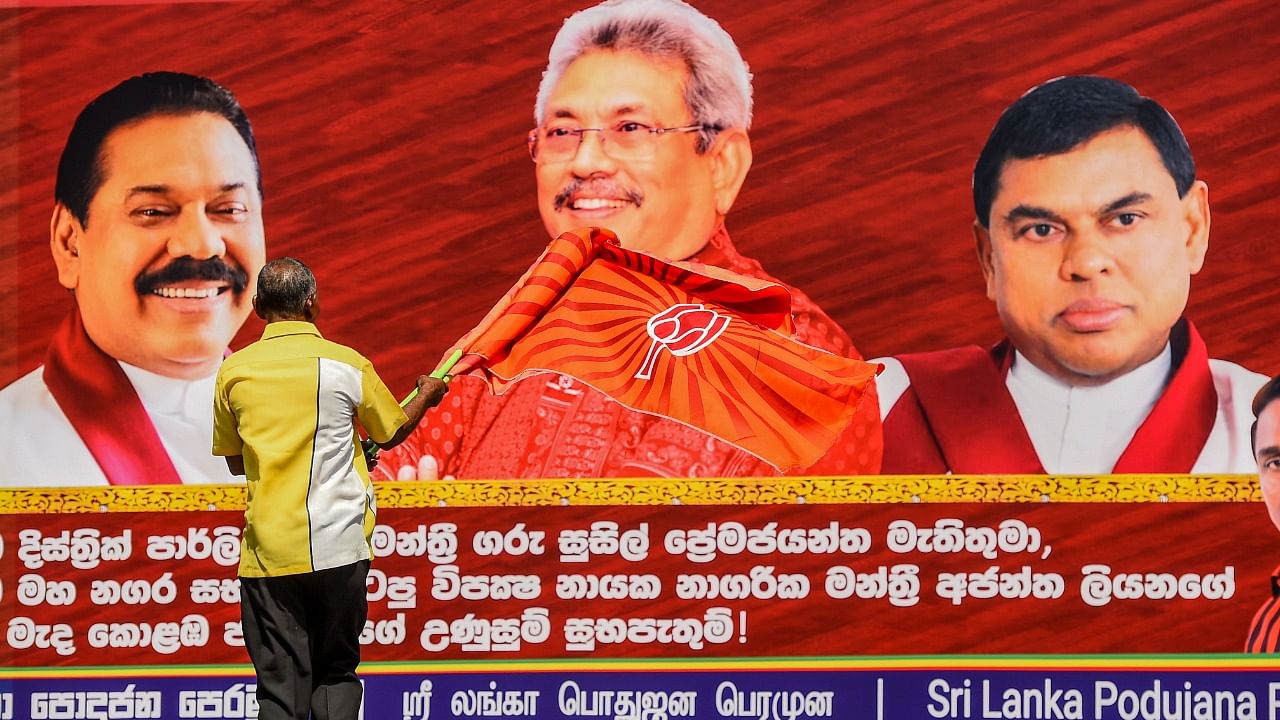
Holding placards and shouting slogans, Sri Lankans converging at the private residence of President Gotabaya Rajapaksa in Mirihana in upscale Colombo on March 31 is a defining image of the all-powerful family falling from the grace of its very own people who, not long ago, hailed them for “emancipating” the tear-shaped island from terrorism.
Once the “war heroes”, especially Mahinda and Gotabaya who as President and omnipotent Defence Secretary vanquished the once-dreaded Liberation Tigers of Tamil Eelam (LTTE), the Rajapaksas are now under relentless pressure from Sri Lankans, especially the majority Sinhalese who once saw them as decisive and strong, to hang their boots.
Ethnic Tamils, who form the majority in northern Sri Lanka, have boycotted the Rajapaksas electorally as they believe the Army under them committed excesses on them during the last phase of the war.
Gotabaya, the president, and Mahinda, the prime minister, are still clinging to their elected posts, but their own family members, including Mahinda’s son Namal, have resigned from the cabinet as protests mount on the island which is still picking the pieces from a three-decade-long civil war that ended in 2019 owing to shortage of everything from bread to LPG to fuel.
The Rajapaksas have lost the trust of the people in less than three years after Sri Lankans handed over an overwhelming victory to Gotabaya as the country looked for a “strong leadership” following the 2019 devastating Easter bombings that killed over 250 people, including foreign nationals.
The victory was sweet for the Rajapaksas after Mahinda suffered a humiliating defeat at the hands of his one-time junior colleague Maithripala Sirisena in 2015. Twenty-three months later, Sinhalese, Tamils, Muslims, and Christians, in a rare show of unity, are on the streets demanding the ouster of Rajapaksas for leading them to the worst-ever economic crisis.
Drowning the island in debt – it is said much of the borrowed money was used for unproductive purposes – defaulting on repayments, shifting to organic farming without any preparation and dwindling foreign exchange that left the government with no money to import essential commodities has brought the island to where it is now.
Also, as part of his populist politics, Gotabaya reduced drastically the tax rates even as agriculture production fell which is now spelling doom.
The Covid-19 pandemic which disrupted normal life also had its effects on the Sri Lankan economy, heavily dependent on tourism, as international travel was at an all-time low in the past two years.
“From war heroes – Mahinda in 2010 and Gotabaya in 2019 – the Rajapaksas have become villains of the economy. This shows military commanders (Gotabaya) don’t necessarily become good administrators,” senior journalist and Sri Lanka expert R Bhagwan Singh told DH.
Singh added that Lanka defaulted on repayment of loans availed from China and other sources and the country’s foreign exchange dwindled to an all-time low leaving it with no money to buy food. “Also, Gotabaya decided to go only for organic farming and stopped the import of fertilizers that led to the depletion of farm production. As a result, the island is now facing a calamity,” he said.
Prof. Ramu Manivannan, former Head of the Department of Politics and Public Administration, University of Madras, felt economic downslide was not the only reason for the downfall of the Rajapaksas and maintained that corruption and authoritarianism fell the powerful family, which thought it was invincible.
“Corruption and authoritarianism are the worst combinations in politics and a dangerous proposition. The Rajapaksas are corrupt to the marrow of their bones. Democracy can survive all forms of oppression or denials, not corruption. Many countries face economic crises, but when people are brought to the streets, it signifies that much has been eaten away (from the system),” Prof. Manivannan, who has worked among Tamil refugees, added.
Rajapaksas’ friendship with China also cost the island much, experts said, pointing to Mahinda rolling a red carpet for China by allowing it to build a massive port in his hometown in Hambantota – which has now been taken over by Beijing due to non-payment of loans – even as India, which continues to help the island, looked on helplessly.
However, Singh said, India has now turned up as a saviour. “It (India) seems to be succeeding in unseating the dragon (Chinese) from the island, albeit for now. It may be noted that power projects in strategically vital lands close to India that had earlier been given to China have been handed over to us,” he added.
Col (Retd) R Hariharan, who was part of the Indian Peace Keeping Force (IPKF) to Sri Lanka, concurred: “India-Sri Lanka strategic relations are poised to grow in the coming days not just because of the help that New Delhi has provided to Colombo, but also due to the strategic reset in the Indian Ocean region in the wake of the war in Ukraine,” he said.
Watch the latest DH Videos here: